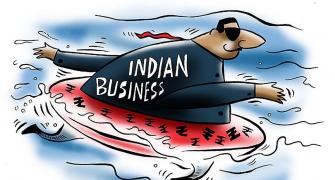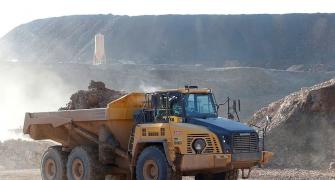 In the last two years, Airbus has not bagged a single order from India, and it is unlikely to do so this year.
In the last two years, Airbus has not bagged a single order from India, and it is unlikely to do so this year.
It delivered over 40 aircraft in 2008, 29 in 2009 and expects to hand over not more than 19 in 2010. The reason is that the aviation sector has taken a severe beating.
The economic slowdown, the price wars and high fuel prices caused huge losses in the books of all carriers.
It is only in the last one or two quarters that things have started to improve. Traffic has picked up, prices have stabilised and losses have begun to come down.
But it is still a far cry from the halcyon days when Indian carriers were placing orders that ran into billions of dollars left, right and centre.
Airbus Executive President (marketing & contract) and President (India) Kiran Rao remains bullish on India. "The forecast of 1,000 new aircraft (worth $105 billion) for India in the next 20 years is still pessimistic," says he.
To put it in perspective, there are 440 aircraft in the Indian skies at the moment; 223 of these, or almost 51 per cent, are from Airbus. Rao expects carriers to place orders one more time in 2011.
"The market," he says, "bottomed out in terms of complexities and difficulties in 2009. Carriers no longer talk about deferment of orders."
According to Rao, no Indian carrier has so far cancelled its order, though 2009 saw record cancellations for Airbus worldwide.
(He claims Airbus is sitting on 68 per cent of all future orders). But some orders have been postponed, and some orders have been restructured -- carriers have switched to smaller aircraft. Kingfisher, for instance, has gone for A330s instead of long haul A340s.
This has helped it cut its losses. Industry experts say the losses on long routes can be as high as $1 million a day.
The number of such switches or deferred orders is not known. On a global scale, Airbus officials say that in 2009, the company shifted as many as 600 aircraft to earlier or later slots.
New approach
Rao knows that the next wave from India will not be as big as the previous one which started in 2005 and lasted almost two years.
More important, in the next round, because of the recent bloodbath in the sector, the buyers will be more evolved and value-conscious. So, Airbus has put in place a new approach to India.
The lessons it has learnt in the recent years are that fuel-efficiency is important for carriers, regional routes are more profitable than long-haul routes, and budget carriers are the future of civil aviation.
This will guide what Airbus offers its potential customers in India.
There are several initiatives that Airbus has undertaken to reduce fuel burn in aircraft. It spends around $100 million every year to improve the efficiency of the A320 aircraft alone.
This involves making the aircraft lighter with the use of advanced lightweight materials and improving their aerodynamics. Recently, Airbus launched its new 'Sharklet' large wingtip devices, designed to enhance the eco-efficiency and payload-range performance of the A320 family.
"Offered as a forward-fit option, Sharklets are expected to result in at least 3.5 per cent reduced fuel burn over longer sectors," an Airbus spokesperson says.
"The A320 will be the first model fitted with Sharklets, which will be delivered around the end of 2012, to be followed by the other A320 family models from 2013."
The A350 extra-wide body aircraft, which Airbus will start delivering some time in 2013, will burn 25 per cent less fuel than rivals, claims Rao.
The A380, which will be first delivered to Kingfisher in India some time in 2013, will burn 2.9 litres of fuel per passenger for every 100 km it covers. "The current world average is 5 litres. It will take another 10 years for the world average to reach 2.9 litres," adds Rao.
Market focus
Rao is also aware that more and more orders in the near future will come from low-cost carriers. Since such carriers look for maximum revenue on every flight, Airbus wants to put more seats into its aircraft.
Thus all aircraft of the A350 family can be configured for high-density layouts of 440 seats. The A380 aircraft can seat 525 passengers across two decks and three classes. Airbus believes aircraft will increase in size by 26 per cent in all categories in the next 20 years.
"That is to say that an A320 operator today may chose the larger A321 in the future," says the Airbus spokesperson. The A320s account for almost 80 per cent of the orders placed with Airbus from India.
To help Indian carriers keep their costs under lid, Airbus has set up a pilot and maintenance training centre in Bangalore.
It will be able to train up to 1,000 pilots in the future. It has set up a spares centre in Mumbai. Earlier, carriers had to fly in the spares from the Far East or West Asia.
These will now be made available in India. Airbus has also given a commitment to the Indian government that it will set up a maintenance and repairs centre in the country with state-owned Air India. Rao says that it will come up in New Delhi, and the size of orders from India is big enough to justify the investments.
Aviation experts say that it won't be easy for Airbus to snatch market share away from arch rival Boeing. It too has a large base of loyal customers, and is working overtime to make its aircraft more spacious and fuel-efficient.
It has occurred to almost both Airbus and Boeing that orders for aircraft in the future will come from emerging markets like China and India.
So, the fight for market will be tough. Consolidation in the business may cause carriers to have a single fleet in the future. This could tilt the scales heavily in favour of one or the other aircraft manufacturer.
Much will also depend on how aircraft manufacturers structure the purchase deals.
Whoever offers better terms is likely to get the orders. And after the recent lean patch, who will bankroll the purchase of aircraft?
Is there an appetite for such debt? Rao says that Indian banks are more open than others to finance the acquisition of aircraft. Can Airbus build its business on that?








